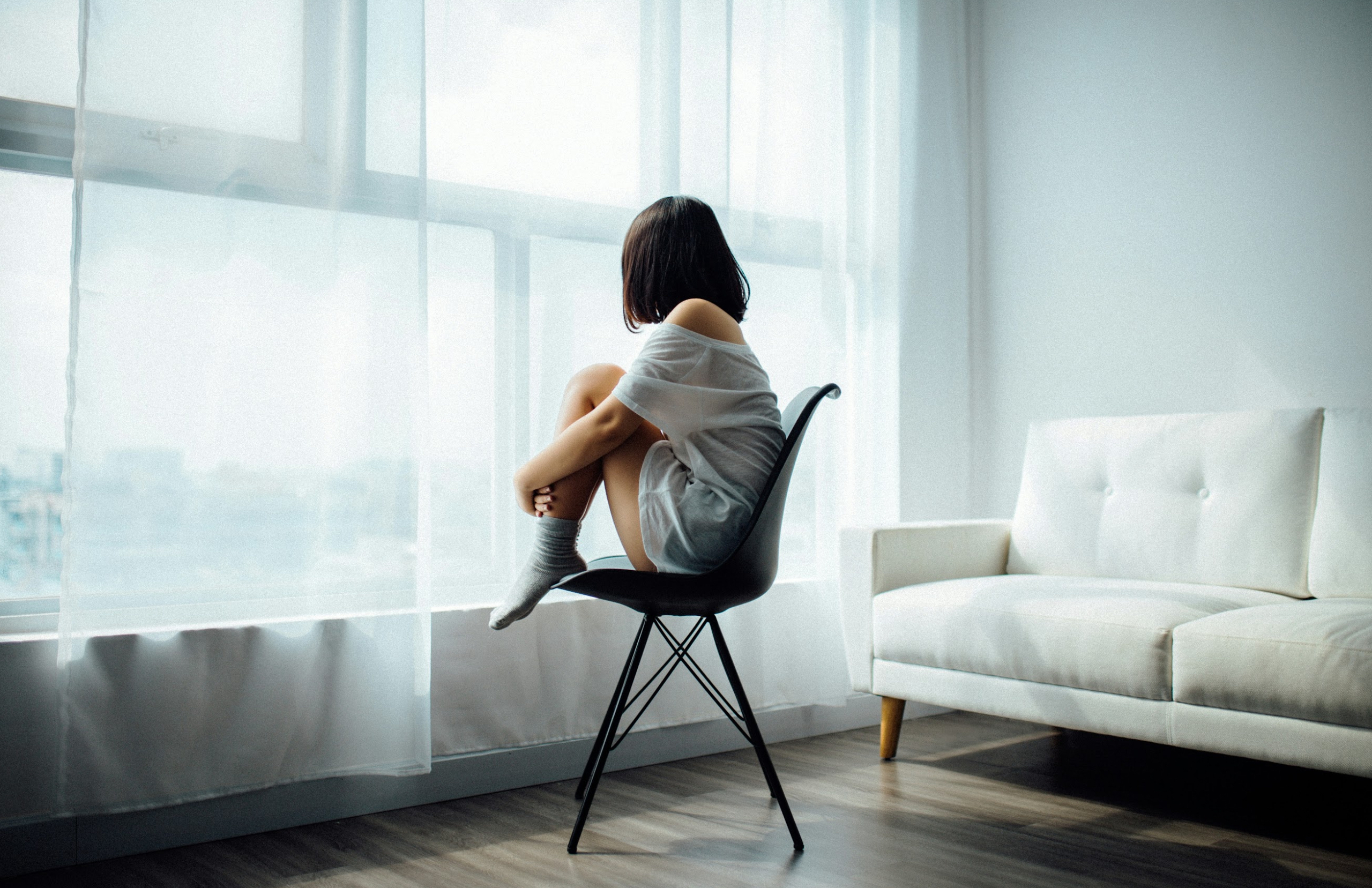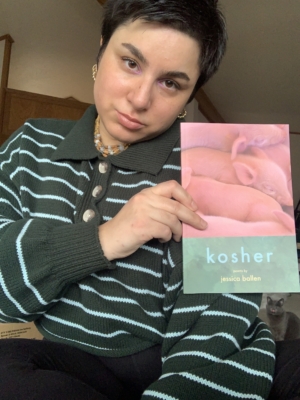The Mask of a Disabled Poet
 I just added the word “disabled” to my author’s bio.
I just added the word “disabled” to my author’s bio.
Before that, I was using “neurodivergent” or “AuDHD” (the amalgamation of Autism and ADHD) as the first descriptors after my name, but thanks to receiving an autism diagnosis around my 35th birthday, I began toying with the idea of typing out “disabled” in describing myself to literary magazines.
I wasn’t prepared for the onslaught of repressed memories and emotions that would resurface as a result.
As a child, I regularly lost control of my body and emotions. Some instances were more subtle than others, but the feeling remained the same: I was a derailing train, and there was nothing I could do about it until the damage was done. Usually, the derailment would only inflict minor harm, but on rare occasions, the entire train would go up in flames.
My first memory of this is, what I call, the ballet-underwear incident. I was so excited to start ballet and dance my little four-year-old butt off, when a girl in class noticed that my underwear was showing. The ruffles of my panties poked out from beneath my pink leotard, so the girl announced it to the class. My world caved in. I sank to the floor and started wailing. I was so distraught I couldn’t stand nor communicate what was happening. Bewildered, my mom carried me out of the dance studio, never to return.
My mother saw my first meltdown, when I was four years old, as just a regular tantrum. Even I thought it was a tantrum up until a few months ago. The experience haunted me for years, following me through adolescence into adulthood. I’ve written several poems about the experience as a way to work through the trauma.
While the ballet-underwear incident impacted the way I viewed myself, the show must go on. Growing up, I went with the flow. I seemed, from the outside, like a regular, abled kid. I played at recess, attended birthday parties, and had several friends. I was an excellent parrot of my neurotypical peers. But deep down, I compared myself constantly to them and judged myself for being different. Nobody suspected that my self-esteem crumbled under the weight of having to perform 24/7 as a normal kid. It was the performance of a lifetime.
In middle school it was harder to get by on that performance. About a month or so in, I developed an upper respiratory illness that kept me out of school for over a month. But it didn’t matter to me. I could relax, even though I was sick, because I wasn’t being overstimulated. (My middle school was huge. There were so many classrooms, so many students, so many noises and echoes.) Once I recovered, my parents tried sending me back, but it was too late; I was already attached to my new stay-at-home schedule.
And of course, by then, my period cramps began to rule my life, too. I developed crippling anxiety and fell into a deep depression. Leaving bed felt like actual death, and Mom and I argued. She tried to yank me from the mattress as I dug my nails into the fabric. I wouldn’t budge. Where I used to miss one or two days of school, now I started to skip entire weeks. My teachers were frustrated. My parents didn’t know how to handle me. So a psychiatrist prescribed me antidepressants, and a pediatrician prescribed me birth control. Neither helped.
In high school, my teachers wrote me off as a troubled teen. I was troubled. But I wasn’t a bad kid. Underneath my school skipping and drug abusing lived an eager student who wanted to learn. I so desperately longed to be a smart kid. But I felt too far gone for that. Drugs and alcohol were way more accessible than finding someone who could truly help me. So I ended up believing I was a kid with a bad case of laziness and a worse case of period cramps, and I self medicated, because nothing else worked.
Then, one summer, I discovered how to make myself throw up. This skill-turned-obsession followed me into my thirties. I focused all my energy on controlling the size of my body—what went in, when it came out, how much weight I could lose in x amount of time. Nothing else mattered, and that’s the way I liked it. But, of course, ignoring everything else in my life came with consequences. Because of all the days I missed by the end of high school, I wasn’t allowed to attend prom, and my graduation was delayed.
Demoralized and burnt out, I dropped out of college after three weeks. I moved out of my dad’s house, then moved back in. I tried college again—for real this time—because I still loved learning, and I continued to feel a strong bond with teachers. With an ADHD diagnosis, I finally started to get some accommodations in the classroom, such as extra time on tests and papers. The extra time let me process each question at my own pace. My thoughts didn’t have to fight for attention, and I could breathe. The panic I felt as a child to complete all my work on time had transformed me into a hyperventilating mess of an adult. I had always needed special accommodations, and having them provided for the first time in college opened my eyes to how long my disabilities had gone undetected. They were hidden, after all.
I was medicated and in therapy. With a lot of unlearning to do, I looked deep into the belly of the beast that was my life. I had spent most of my twenties in Overeaters Anonymous because I made myself throw up multiple times on a daily basis, and I wanted to stop. When I attempted graduate school, studying for my masters in social work, a professor denied me the accommodations I needed, which presented a serious barrier to completing the degree. From that experience, I learned about the Americans with Disabilities Act, which says, “An individual with a disability is defined…as a person who has a physical or mental impairment that substantially limits one or more major life activities, [or] a person who has a history or record of such an impairment.”
I reflected on the separation anxiety that kept me from going to sleepovers and sleepaway camp. My fear of being away from home when debilitating period pains tore through my body. The depression that drowned me in bed for years. The clumps of hair I lost from multiple eating disorders. How I had passed out multiple times in random places, once in a 7-Eleven, convulsing and knocking my head on the ground. And what about the humiliation of simply opening my mouth to speak? Never knowing how words will leave my mouth and present themselves. Stumbling over my own tongue in everyday conversation, or saying the wrong thing and hurting someone’s feelings.
By my early 30s, I had been diagnosed with PCOS and endometriosis. I cried tears of relief in my doctor’s office. And when I received my autism diagnosis, I finally felt whole. Everything I questioned about myself made sense. All this time I felt different because I was different.
There’s a level of acceptance with owning one’s disabilities. Ultimately, it means humbling yourself and asking for assistance when it’s needed. I still struggle with it, but if I want to continue on this path of becoming my most authentic self, I have to ask for help. And usually, people are happy to show up and provide.
As a disabled writer, I still appreciate being home as often as possible. It’s where I feel most comfortable. I take all my medicine, which, to me, includes my heating pad turned up high and my many emotional support cats and being near my husband. I’m also in a low residency MFA program at Antioch University (studying poetry), which means I get to do everything online. And I’ve given myself the gift of working from home, after too many years of pushing my body past its limit.
Living my most authentic life is something I owe to myself. It’s definitely a learning process, but one worth stumbling for. This learning has allowed me to experience joy in ways I denied myself before, and also, to come to terms with the obstacles I faced growing up. Mostly, it has allowed me to look at my younger self with compassion.
I’m removing my mask.
Jessica Ballen is a disabled poet who is currently working on their MFA in Creative Writing at Antioch University, where they serve as Editor in Chief of Lunch Ticket, the school’s literary magazine. They are also a guest editor for Frontier Poetry. Their work can be found or is forthcoming in Ghost City Review, Wild Roof Journal, and Harbor Review, and their book, Kosher, was released in 2023. You can find them compulsively posting on their Instagram stories: @jessiicaballen. Ceasefire now!





